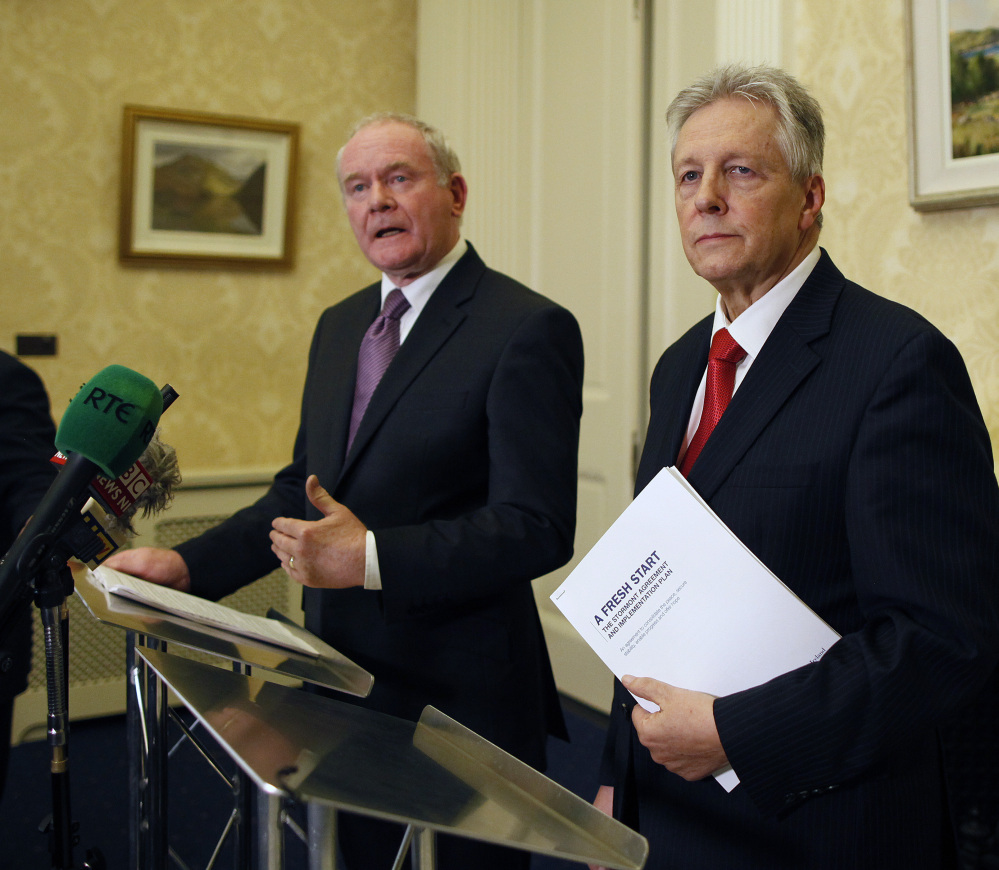DUBLIN — Britain published a long-sought agreement with Northern Ireland’s parties Tuesday that all sides agreed would sustain their Catholic-Protestant government, the central achievement from decades of peacemaking in the British territory.
Tuesday’s 67-page document titled “A Fresh Start” took more than a year of negotiations to achieve. The British Protestant and Irish Catholic leaders of the coalition, Peter Robinson and Martin McGuinness, stood side by side as they praised the agreement as a landmark compromise that would deliver tangible economic benefits subsidized by Britain.
“We have pledged ourselves today to stand together,” said McGuinness, whose Irish nationalist Sinn Fein party represents the Catholic minority.
“Today represents another milestone along the way as we normalize and build our society,” said Robinson, whose Democratic Unionist Party represents the Protestant majority.
McGuinness said the agreement failed to deliver Sinn Fein’s key demand for investigators empowered to unearth the truth about the most bitterly disputed killings from Northern Ireland’s four-decade conflict. He blamed Britain for refusing to lift the veil of state secrecy on files documenting the role of British soldiers and spies in killings.
But McGuinness said the deal secured enough common ground to keep the coalition running. This includes commitments from Britain to provide more than $760 million in funds to soften the blow of welfare cuts long opposed by Sinn Fein.
And significantly, McGuinness said Sinn Fein would accept a new oath of office committing all Northern Ireland lawmakers to reject illegal paramilitary groups and seek their disbandment. An expert report published last month concluded that the IRA command structure still exists and seeks to direct Sinn Fein policy.
“There can be no place whatsoever for armed groups in our society. There can be no hiding place for criminality,” said McGuinness, a former commander of the outlawed Irish Republican Army, which killed nearly 1,800 people before calling a 1997 cease-fire.
Northern Ireland’s 8-year-old coalition has threatened to unravel since 2014 when Sinn Fein blocked efforts to impose budget cuts on welfare payments that already had been enacted throughout the rest of the United Kingdom.
Tensions rose further in August when the IRA was accused of killing a former member in a revenge attack.
Protestant leaders started to withdraw from cooperation with Sinn Fein and threatened to collapse the coalition.
Robinson said the toughened pledge of office, plus plans to form an all-Ireland organized crime task force, would put “those still involved in terror and criminality out of business once and for all.”
Send questions/comments to the editors.



Success. Please wait for the page to reload. If the page does not reload within 5 seconds, please refresh the page.
Enter your email and password to access comments.
Hi, to comment on stories you must . This profile is in addition to your subscription and website login.
Already have a commenting profile? .
Invalid username/password.
Please check your email to confirm and complete your registration.
Only subscribers are eligible to post comments. Please subscribe or login first for digital access. Here’s why.
Use the form below to reset your password. When you've submitted your account email, we will send an email with a reset code.